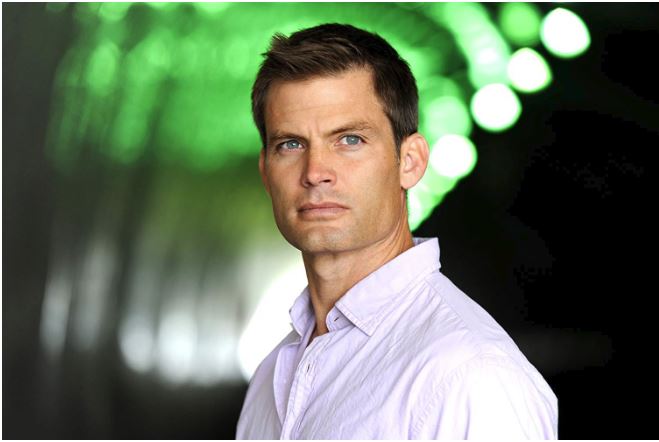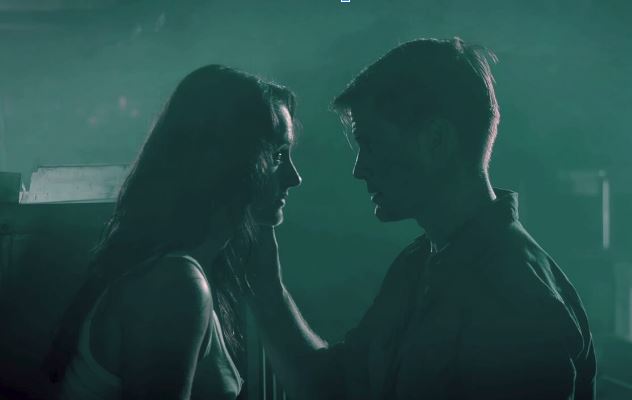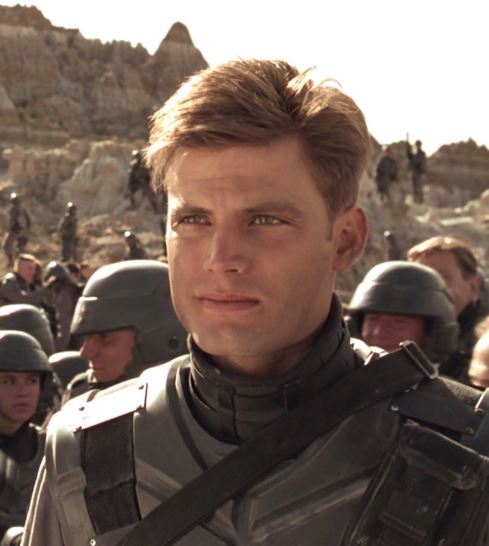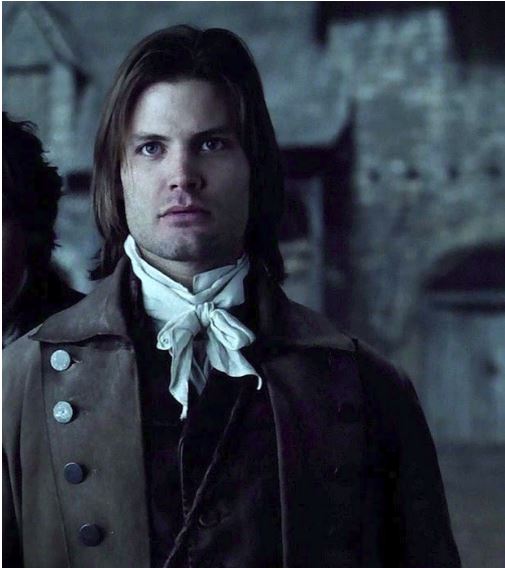I got to chat with Casper Van Dien and discuss his military childhood, STARSHIP TROOPERS, being a Director, and working with Robert Rodriguez in the upcoming ALITA: BATTLE ANGEL. He got to play an amazing character in DARKNESS REIGNS releasing on VOD July, 13th. He played the part of none other than Casper Van Dien! Here’s the conversation between me and Johnny Rico himself!

Dr. Grant: Thanks so much for doing this interview.
Casper Van Dien: Well thank you very much. I really appreciate it. I’m glad to do it.
DG: Jumping right into Darkness Reigns that is coming out soon, what’s it like to play yourself, or a version of yourself, on screen?
CVD: Yeah, it was interesting to see me written this way. To see me written as an obnoxious version of myself. It was interesting to read that and I thought it might be interesting to play that. There was a lot to play off of and there were some similarities with the character, even to the point where he had written that I was coming in late and my plane actually got delayed and the flight switched and it was like all these problems that I had. We got in twelve hours later than we were supposed to. So it was really funny and I said to Andrew P. Jones, the writer of the film, “You got to be careful what you’re writing there. That’s just too weird.” He said, “I’m so sorry”, and I said, “Don’t even worry about it”, and then he said, “Well you’re handling it different than your character!”.

DG: I did like the perpetual “He’s in a bit of a mood” bit around your character and when you were doing the on camera interview and your character says, “What lens are you using? Ok, I’ll look here.” That interview expertise has to be something you pulled from personal experiences.
CVD: Well, it’s interesting. He (Andrew P. Jones) wrote this. He’s done interviews before and he’s edited for NAKED AND AFRAID for a long time too, so he’s used to hearing these different things so when he wrote all this I was just like “Oh this is really funny”, because I have known actors that have had a bad attitude and then just seeing this too and just playing what you’re playing in the moment, It was fun. It was a lot of fun to do that because some of these people you see are so obnoxious about it. They can be so charismatic on camera but then it seems like--I don’t know how to put it. I guess my character seems like such a tool up to the point where he talks, ( on camera during the interview) then he’s saying what he thinks everybody has to hear. Sometimes that’s what an actor is anyhow.
DG: With regard to acting in general, do you have a preference to trying to raise your game to someone else’s, or to raising someone else’s game and building up their confidence?
CVD: I think Stanislofsky said it best when he spoke of a collective creativeness. Everybody has to do their part and I think we have to collaborate and try to raise the bar for everyone involved. I think the director doesn’t just want you to participate. It’s amazing that films get made because sometimes they shouldn’t. You have all these people that don’t know each other, they all have different jobs, and somehow manage to get it done. For me, that’s always fascinating because I love films. I love watching them, I love being around them, but actually participating in them is exciting and exhilarating. I just feel grateful that I have the opportunity to do that. I like being part of the team and making this thing come together.
DG: Absolutely! I come from a music engineering background and there’s a little bit of that but you don’t have that visual element. Knowing the challenges of making a record, I can’t imagine how difficult it is to put a film together.
CVD: Even a record you still have all that collaboration going on together so you guys have a lot you have to do. I think every job does but here we are putting the sound with the visuals and all the props and visual effects and the editing and the color correcting. Everything that goes into it. It’s such a magical process. The whole thing of getting it made is very artistic and very creative. You feel like everybody’s working together. They say it takes a village to raise a kid and here we are raising this whole film and it feels like that sometimes. It feels like you’re participating in creating something.
DG: I do feel like every job is an art form in itself. An editor or a color corrector like you said, all those elements are a skill and an artform.
CVD: Absolutely. I agree one hundred percent.
DG: You’ve actually done some directing yourself.
CVD: I have. I’ve directed three films. I’ve had offers to do others ones but I just couldn’t make it work. That’s another great process because you really get to participate in the creative process. I’ve also had to work as an actor in all of those films which was part of the deal. It was like, “hey we’ll let you direct this, but you also have to be in it. So it was one of those deals which was still awesome and amazing to be a part of. Then you’re really collaborating even on a deeper level with everybody. I think even as an actor you have to collaborate with everybody because you’re helping the visual effects people. You have to know what’s going to be there so you can make it look as real for the audience by being totally into whatever it is that you’re trying to see and what isn’t there that they’re going to later put in so you have to suspend the disbelief in the unseen so that later when it is in there they can be like, “Oh my God, there’s these giant bugs or whatever it is--or the demons, whatever we had in DARKNESS REIGNS.
DG: IS there a specific vibe you’re trying to establish on set as a director?
CVD: Even there, I liked Stanislofsky a lot when I was younger, reading about him and Neglected Creativeness. I really get into, so everyone’s got to do their part and you have to know when you're hiring someone, you want to make sure they can do their job and they’re really excited about it. You’re like the parent a lot and you’re also trying to help guide everybody and trust that they’re gonna do their job and you have to go over it with everybody. You have to listen to everybody. As the director, everyone is coming to you because they want to make this product, or film, or whatever it is and they want to do their job, so you have to hear everybody. You just have to be a little bit more patient.
DG: As a director were there things you picked up from Paul Verhoeven and Tim Burton as an actor working on those earlier projects?

CVD: Oh yeah! I always studied. This is interesting for me. As a kid, I would ask my father, “Who directed that film?” and my Dad was a military guy. He was more into just watching a film. I followed different directors. I loved John Ford. I loved a lot of different directors and of course Spielberg and all those and going back to see different ones and see who they liked. So you know you’re a different breed when you’re actually asking questions about how a film was made. It’s not normally what I think a young kid looks at but it was just something that I was very curious about. So when I got to work with these great directors, I was already a fan of Paul Verhoeven just because of ROBOCOP, and TOTAL RECALL, and all these different films that he’s done, so I was already a fan and getting to be on that film as his number one actor on set and I’m thinking, “Oh my god, I’ve really got to do my job and I don’t want to mess up. So you watch him direct and then later when you’re directing, you’re definitely thinking about what he did. And I can see some of those shots, like, there’s the one (in STARSHIP TROOPERS) where we’re in Whiskey Outpost and you see the crane shot and it comes over and he describes all these bugs coming and I’m like, “Oh, it’s that shot from ZULU!”, so you’re seeing that he’s using other great directors and footage from different films and you’re wondering where that came from and the curiosity of that as well. I don’t know if that’s always normal but it is what I was thinking about. So when I was directing my first film, I was thinking of ROBIN HOOD, the one with Errol Flynn and Olivia de Havilland. I was thinking about that film and I tried to put in some scenes from there. I tried to borrow different shots and tried to see what I could make that looked similar to a film I liked. When I directed STORAGE LOCKER, I was thinking more of MANHUNTER, so I’m going off different films. Of course you can’t make everything exactly like something but you can have an idea and from there, if something gets birthed, it’s different than what you had even perceived because other people bring different things to the table. I think you just have to have an openness with that.
DG: Right, well I think that’s the beauty with the whole village concept like you said, because there are so many moving pieces that there is no way to replicate something, or at least not easily.
CVD: You know, I went to military school and I was Operations Officer in charge of all the PIT work, waking everybody up, putting them on watch formations, calling out all the orders and everything like that and I think to some extent, being a director is like that. They’re in charge of calling out every order and making everything go and you have the producers who are putting up the money which is like the battalion commander behind it who’s really the boss, but the director’s doing their job. Sometimes the director’s both. It’s fun to do. I love it. STARSHIP TROOPERS was like a well oiled military machine at that time because you got captain Dale Dye, the military coordinator, having all of us troopers do our maneuvers and tactical formations. We did a boot camp beforehand and it was fascinating for me to see that too.
DG: It’s got to make it easier to do a military film like that because you’ve already got that mindset ingrained in the actors.
CVD: Yeah, when you do the boot camp and everything like that-- You know, my Dad was twenty years in the service and he taught it for eleven or twelve years afterward and I’d go to boot camp with him at age four and up until I went into military school myself. So I got to participate in his boot camp and then I went to my own military school. I loved military films and all the stories my Grandfather told about being a marine in WWI. All the different things you hear, I think that helped me for that film too.
DG: You must have been a really obedient child or just the worst. Had to be obedient right?
CVD: My parents always said I was the easiest kid. I don’t know if I necessarily was because I got in enough trouble too but I chose to go to military school. My Dad was like, “I’m proud of you”, and my Mom was like, “Please don’t go”. (laughs) I was very fortunate. That’s where I began to think I wanted to go give the acting thing a shot. That was thirty years ago and it’s all I’ve been doing ever since. I wasn’t a troublemaker in the sense that I got sent to military school. It was a choice. A consistent choice.
DG: What do you think are some of the keys to being such a consistent working actor throughout this timespan where things have changed so much?
CVD: I don’t know. There are some actors that I used to know when I first came out to LA. I had no idea how long I’d do it. I’d see a lot of them quit and say it’s too much. There’s a lot of rejection. There’s a lot of going out for things where people tell you you’re too tall, too short, too thin, too fat, too good looking, or not good looking enough. I’ve heard everything over the years. I think you have to have a thick skin when it comes to that. They say the four stages of acting are: “Who’s Casper Van Dien? Get me Casper Van DIen. Get me YOUNGER Casper Van Dien. Who’s Casper Van Dien?” And then you can put in any actors name in there. I’ve been very lucky. I don’t know what I can contribute it to. I like to show up early. I like to be prepared.
DG: Talking about how things have changed over the years, you clearly have not been afraid to jump into a new medium. You did the Mortal Kombat web series.
CVD: I got a best actor for that! It was for the eighteenth annual Webby Awards and I didn’t even know it had been around for eighteen years. That was five years ago, so it’s like twenty something now. I got a best actor for that and they decided to shoot a season three and we filmed a season three and that was four years ago and it hasn’t come out yet. I think it was because the studio and Earth Realm, the video game people, didn’t totally agree on the episodes. You know, I have no idea what happens or what makes anything work in this industry. It’s still such a fun process for me to be a part of. When I got that call to play a D list actor Johnny Cage, a martial artist, I said, “What are you talking about?”, and he said, “Oh my god this is perfect!” I was like, “What are you trying to say?”, and he said, “Oh this is just awesome!” I just never broke character. I stayed like that the whole time with him. That was so much fun to do too, cause I loved the video game when I was a kid and so for me to get into this--It’s such a thrill because I love books too. My Dad’s favorite movie character was Tarzan, so when I got to play Tarzan, that was a thrill. I loved reading Starship Troopers when I was in military school and before that too so that was a thrill. With, SLEEPY HOLLOW, my family were Dutch settlers and we heard all those ghost stories that Washington Irving took Rip Van Winkle and Sleepy Hollow and wrote all those into his book and those were all Dutch settler stories. My family in the movie were related to the Van Burens so it’s always fun to play these iconic literary characters that you read and are a fan of, or even video games that you’re a fan of.

Recently, I just played Jimmy Doolittle, who was the most decorated pilot we had in World War I and then after the Japanese bombed Pearl Harbor, he re-signed up at the age of forty-six and came up with the idea of taking B-25’s off aircraft carriers; army planes off navy aircraft carriers and they bombed Japan. It was supposed to be a suicide mission and he got all these young guys to volunteer and he tricked the Navy and Army into letting him lead it even though they didn’t want him to go because they didn’t want to lose him because he was too valuable. He figured the only way he could get those young men to come back, even though it was a suicide mission, was if somebody with his skill and experience lead them. That’s the only thing he thought would give them any chance. And he was the only one he thought had that skill. He did this in 1948 and came back. I love him and think he’s a great hero. Spencer Tracy got to play him in 30 SECONDS OVER TOKYO and Alec Baldwin played him in PEARL HARBOR and this is his real story. It’s the first time he’s had a whole film around him. I just finished that. And then in DARKNESS REIGNS, to play myself is just another new challenge, or a dark version of yourself. I think that’s because of Starship Troopers that I get to play some of these characters and why I’ve had a lot of longevity in this career. It’s been a curse and a blessing but mostly a blessing.
DG: So I guess the main question now would be what books are you reading since what you seem to be into is what you’re going to play next.
CVD: One of the books that I re-read and would love to do is Jitterbug Perfume by Tom Robbins. It’s just an incredible love story that spans 1000 years. Use to be, I wanted to do “The Sun Also Rises” by Hemingway because Jake Barnes is one the most famous characters and I wanted to play that him. When it was first made it had Errol Flynn and Ava Gardner but it wasn’t as good as the book. The book was incredible. It’s one I’d like to make as far as films go. I also do daily readings of different books that I read because I’m 23 years sober so I have some books on sobriety, spirituality that I read as far as that goes on a daily basis. I read the news all the time and I just pick up different books here and there and look at them as well. I read some things on Doolittle which were interesting too for that character. And the last biography I read was on Mark Twain.
DG: You recently got to shoot some scenes in ALITA: BATTLE ANGEL right?
CVD: Yeah, that was amazing to work with Robert Rodriguez. it’s funny because mainly what he wanted to talk about on set was STARSHIP TROOPERS. Here I am just excited to work with him because I’m such a huge fan of his but he wanted to ask me questions. He goes, “You know how people have music playlists? I have a movie playlist like of 150 films and I have them playing in the background. I’ll turn the sound down really low and I’ll put this thunder sound on when I’m writing or editing”. And he goes, “So I got that movie playlist on in the background. There are three films, and STARSHIP TROOPERS is one of them, whenever it comes on, I turn the thunder off and I turn the sound on and I just watch. I can’t tell you how many times I’ve seen STARSHIP TROOPERS.” He just asked me questions about it and talked about it. He’s a really intense man and I was so excited to be around him and just to be directed by him was a thrill.
DG: There’s got to be a lot to pick up from him. He seems like someone that wants to teach that. He’s been doing that for a long time, trying to help people become better filmmakers.
CVD: He is. He’s very much into collaboration. You can also tell he’s a huge fan of films. That’s always exciting to be around filmmakers that are huge fans as well. I love them, being around them and a part of them. I got that part because my buddy Garrett Warren who is stunt coordinator on the film and he’s been Second Unit Director on a lot of films. I know he was stunt coordinator on that film for sure. He also worked on AVATAR. He was on STARSHIP TROOPERS with me. He had me put myself on tape for the role that I played and snuck it into Rodriguez and he was like, “That looks like Casper Van Dien!”, and Garrett was like…”Yep!”. And that’s how I got it. Really appreciative of my buddy. He was just like, “I know you’re perfect for this”. And one of these days, Garrett will be directing. He’s been second director on LOGAN, Divergent and others, and stunt coordinator on AVATAR and lots more. He was actually the director of that third season of MORTAL KOMBAT, the one that hasn’t come out. He actually directed all that.
DG: Well thank you so much for speaking with me and congratulations on all your success.
CVD: I appreciate it and thanks for the interview!
I had a blast speaking with Casper Van Dien about his past and it would appear that he is nowhere close to slowing down in the future.
DARKNESS REIGNS releases onto VOD July, 13th
-Dr. Grant

